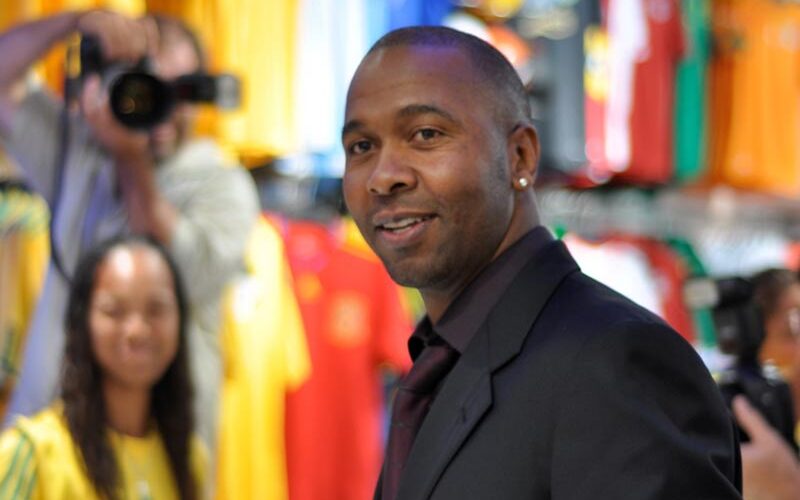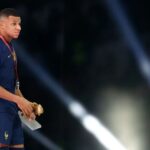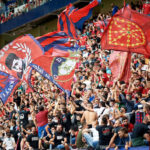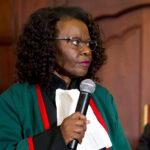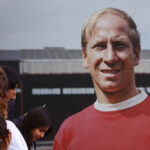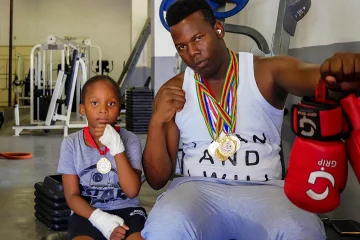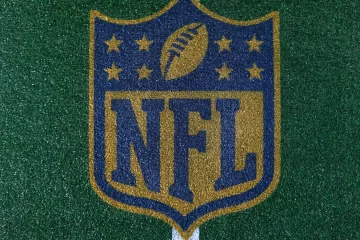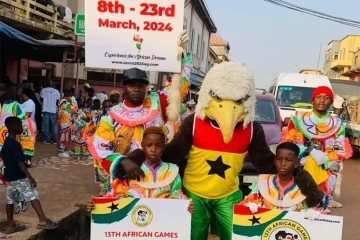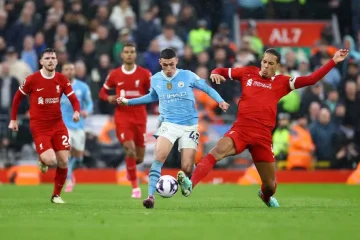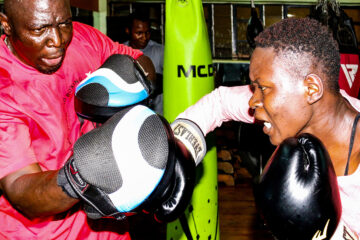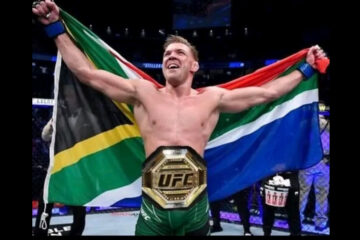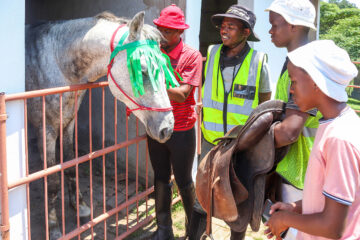THIS first of a two-part series tells the story of Lucas ‘the Chief’ Radebe, who was just one of many players from Africa who changed the face of English and European football.
“The Chief”
Try as he might, Lucas Radebe could not hold back the tears. Almost 40 years to the day since Albert Johanneson’s historic appearance in the FA Cup final, nearly 38 000 supporters crammed into Elland Road on 2 May 2005 to say goodbye to one of Leeds United’s most iconic players at his testimonial.
It was difficult to underestimate the impact “The Chief” had made in the decade since he and fellow South African Phil Masinga first arrived in Yorkshire. After rejecting an approach to join Manchester United having become captain of the vibrant Leeds side which somehow reached the last four of the Champions League in 2001, Radebe’s influence had always extended way beyond the pitch. As well as the Kaiser Chiefs rock band who were christened in honour of his former club, a Twitter exchange in August 2019 revealed that “Lucas” continues to be one of the most popular boys’ names in Leeds, with a number of supporters getting in touch after Radebe responded to one fan who had named his son after the former captain.
But even more than his cult status in the city, Radebe became a Premier League legend who transcended club loyalty thanks to his wholehearted performances and unwavering commitment to the cause. “This is my hero,” admitted President Nelson Mandela when he met South Africa’s captain on a visit to Leeds Town Hall in 2001.
By then, the effects of years of injuries and repeatedly travelling back and forth to represent his homeland were already taking its toll on Radebe’s body. The victim of a shooting in 1992 – a few weeks after Kaizer Chiefs had faced Steve Coppell’s Crystal Palace and his future teammate Nigel Martyn in a historic pre-season match – while on his way to the local shop in Diepkloof in Soweto, the bullet miraculously entered his back and somehow missed any organs or arteries before exiting through his thigh. “There was a history of players being shot for swapping teams,” he later recalled. “But I’ve no idea what the motive was in my case. Nobody was caught. Nobody saw who did it.”
Radebe recovered sufficiently to move to Leeds with Masinga two years later. After the appearance on the wing for his debut, however, he lasted just 24 minutes on his first start in central defence against a Coventry side featuring Peter Ndlovu before rupturing the cruciate ligaments in his right knee. Never fully trusted by Howard Wilkinson – the manager who had guided Leeds to the last First Division title in 1992 – it wasn’t until former Arsenal boss George Graham arrived at Elland Road in 1996 that he established himself as a regular in the first team.
Being part of Bafana Bafana’s victory in the Africa Cup of Nations on home soil at the start of the year along with Masinga had helped cement Radebe’s status as a national hero. Two months later, his willingness to don the gloves at Old Trafford when goalkeeper Mark Beeney was sent off in the first half of a league match against United began his burgeoning love affair with the Leeds faithful. Having started out between the sticks in his youth sides, Radebe pulled off some miraculous saves and was only beaten by Roy Keane’s winning goal 18 minutes from time.
When Graham moved to Spurs at the start of the 1998/99 season, Radebe was made captain by his replacement David O’Leary and played an integral role in helping his young side finish fourth. They went one better the following year to qualify for the Champions League, with the South African’s performances attracting the attention of Sir Alex Ferguson, AC Milan and Fabio Capello’s Roma. “Everyone should be interested in Lucas,” said the United manager at the time.
Yet his allegiances to the club which had given him his chance in European football meant Radebe never seriously considered leaving Elland Road for their bitter rivals despite the significantly improved salary on offer.

“When I first went to Leeds, I appreciated the opportunity of playing in the Premier League, even if they were lingering near the bottom half,” Radebe recalls. “For me, that’s one of the things that pushed me to stay at the club, as I felt very loved there because of how they looked after me. It’s about the loyalty. I think if I had gone to Manchester United at that time, I wouldn’t have grown as I did at Leeds, and make the impact that I did. I felt that I belonged to Leeds United.”
He would later refer to the £18 million purchase of Rio Ferdinand from West Ham in November 2000 as the moment the club’s adventure under former chairman Peter Ridsdale began to spiral out of control – a situation that would lead to relegation in 2004. But for a few months that season, anything had seemed possible. Despite a 4-0 thrashing by Barcelona at the Camp Nou in their opening Champions League match that saw Radebe carried off on a stretcher in the final minute, having suffered the first of many concussions in his later career, Leeds went into the final game knowing a draw against Milan would take them through ahead of the Spanish club.
A formidable performance from Radebe helped O’Leary’s young side escape the San Siro with the result they needed, with Ferdinand arriving a fortnight later in what was then a world-record fee for a defender. But just as the new partnership was settling in, disaster struck during the penultimate second group stage tie against Real Madrid. Leeds had already booked their place in the last eight after ending Anderlecht’s 20-match unbeaten run at home in [the] European competition in the previous game. Yet the sight of their captain being stretchered off after 61 minutes after he had twisted his right knee making a clearance was the main talking point among supporters on their way back to Yorkshire after the 3-2 defeat.
Radebe ended up missing the victory over Deportivo La Coruña in the quarter-finals and the defeat to Valencia in the last four as the number of injuries he had suffered over the years finally caught up with him. When Ferdinand was sold to Manchester United in 2002 for £30 million, his fellow defender was out for the entire season but did manage to mark his second appearance at a World Cup finals with a goal against Spain. Radebe retired from international football a year later after Bafana Bafana’s historic friendly against England and admits the air miles he racked up amassing his 70 caps had been a contributing factor to the longevity of his career.
“I had a terrible time,” he says. “Most of the decisions to retire are made by players who know they have to do something to keep their careers going. Travelling back and forth on long-haul flights all the time causes injuries and eventually takes its toll on the body. And there’s no appreciation of the effort you are putting in. As players you need to be treated as number one – when you retire only you have to live with your body.”
As Radebe admits, the scheduling of the Africa Cup of Nations must take most of the blame for the demands placed on the continent’s players at the turn of the new millennium. By then, such had been the influence of the Leeds captain that more than 30 could be found on the books of Premier League clubs, compared to just three in 1993. But if the performances of players like Radebe, Nwankwo Kanu and Coventry’s Moroccan duo Mustapha Hadji and Youssef Chippo persuaded more and more club managers to recruit African players over the next decade, the prospect of losing them for six weeks in January every two years also dissuaded many.
“With the Africa Cup of Nations being played at a crucial time in European leagues, it brings up an enormous problem in terms of contradictory interests,” wrote then Chelsea manager José Mourinho in the Portuguese sports paper Record in 2006. “The national teams are protected by legislation, the clubs are without legal power to fight for their interests. Chelsea without Drogba, Liverpool without Sissoko, Arsenal without Touré, Barcelona without Eto’o, Porto without Benni McCarthy, Benfica without Pedro Mantorras are some examples which leave us weakened and which surely push us to ask the question, ‘Is it worth signing them?’”
“I won’t give up on African talent and its footballing characteristics,” Mourinho added. “I will continue to contribute towards its progress but never with more than one player from the same country, because I cannot be in the hands of good sense or the lack of it.”
Nonetheless, by the time Radebe hung up his boots in 2005, the number of African players in England’s top flight had sailed past 40, with many enjoying similarly exalted status as the Chief of Elland Road. Hadji, who arrived in 1999 and spent two years at Highfield Road before moving to Aston Villa, certainly belonged in that category too.
“It’s because I was one of them,” he says two decades on. “When I met people on the street or in a bar I was always talking to them – even if I didn’t know their names and would never see them again! It’s the best way to adapt yourself – to let people see you the way that you are rather than looking at you like a footballer. I wanted people to look at me like the man I am, not just a Coventry player.”
Born in Morocco, Hadji moved to Alsace-Lorraine with his family as a child and represented France at Under-21 level before opting to play for the Atlas Lions. Along with midfielder Chippo – who spent four years in the East Midlands – the Moroccans were so popular at Coventry that supporters became fond of wearing fezzes to matches in their honour and Hadji believes that was partly down to the cult status Ndlovu had enjoyed at the club.
“He left just before me and I think for all the fans and English people seeing what he could do made it much easier for the players who came afterwards. That’s why I always say to modern players that when you play somewhere it’s not only about you. You have to be an example for the people who are coming after you. Moroccan players today have to be an example for the next generation. For instance, if Chippo or I or Drogba had come to England and had a bad image, then it would have made it difficult for African players to establish themselves in the Premier League.”
“It takes a lot out of you, my heart is weak,” admitted Lucas Radebe in an interview with The Guardian in April 2004. Having seen the majority of their highly paid stars leave the club after Ridsdale’s gamble backfired spectacularly, Leeds were staring down the barrel at relegation after a disastrous season that saw Eddie Gray – Albert Johanneson’s successor on the left wing – installed as the caretaker manager. Defeat against Bolton a few days later eventually confirmed the inevitable as Gray was sacked, with Radebe making just three more matches in the Championship the next season before finally calling it a day.
His final appearance at Elland Road for his testimonial saw a Leeds XI featuring Masinga and Vinnie Jones take on an International XI containing Bruce Grobbelaar in goal and a Nigerian who could also rightfully claim to have captured the hearts of supporters throughout the country. “It was brilliant playing with some of those players,” young Leeds defender Frazer Richardson told the Yorkshire Evening Post. “I’d watched some of them when I was younger and you try and learn from them. Jay Jay Okocha was a different class.”
So good they named him twice, as the chant goes, the playmaker’s dazzling array of skills that had enchanted Jürgen Klopp and the rest of Germany during his spell at Tony Yeboah’s former club, Eintracht Frankfurt, arrived in England in 2002 as part of Bolton’s cosmopolitan side. Okocha’s story was a classic tale of opportunism that saw him move to Europe as a 17-year-old after impressing the coaches of German Fourth Division team Borussia Neunkirchen after going to visit his brother’s friend on holiday in 1990. By the time he set foot in Lancashire, as well as embarrassing Oliver Kahn for his famous goal against Karlsruhe, he had gained a reputation as one of Europe’s best free-kick takers and earned a £14 million move to Paris Saint-Germain in 1998 – an African record at the time.

Okocha – by then, like Arsenal’s Kanu, already an Olympic gold medallist and African champion – was the culmination of a long history of Nigerians to have graced English football. Almost 40 have now played in the Premier League, more than any other African country. A tour party representing Nigeria’s embryonic Football Association which played nine matches against some of England’s most prestigious amateur teams in 1949 was also the first ever by an African football side to visit the UK. Still over a decade away from gaining independence before Ghana would lead the way under its new leader Kwame Nkrumah in 1957, the trip was designed to “help the people of Nigeria and the United Kingdom to get to know each other”, according to Nigerian Governor-General John Macpherson.
“Too many of the people of the United Kingdom have had little opportunity to learn about the colonies and their peoples,” he added. “There is much that we of the ‘home country’ can be proud of in our colonial record, and I believe that high on that list we can place our passing on of our love for games – football, perhaps, most of all.”
Considering they had endured a two-week voyage from Lagos in third class while their chairman – an Englishman named Captain DH Holley, travelled in a first-class cabin on the Elder Dempster ship, MV Apapa, with his wife – defeats in only the matches where the Nigerians were required to wear boots certainly made people take notice. A 5-2 victory against Marine Crosby in their first match in front an enthralled crowd on Merseyside with 10 players in barefoot led the opposition captain, Len Carney, to admit “we soon found their feet were harder than our boots”. According to researcher Olaojo Aiyegbayo, some of the fans even urged the home players to take their boots off to try to compete.
A 2-2 draw in their final match against South Liverpool at the club’s first game under floodlights rounded off a successful tour that had also seen the Nigerians narrowly lose to serial non-league trophy winners Leytonstone and train at Highbury. But while flying winger Ahmed Tijani Ottun would return to play in English football along with teammates Titus Okere (Swindon Town) and Teslim Balogun (Peterborough), a cartoon in the Liverpool Echo newspaper after the match illustrated the prevailing attitudes of the time.
“Is that a Nigerian flying down the wing?” asked one man. “No, it’s a bat,” came the ridiculous response from his friend. The cartoon was drawn under a banner which read: “Floodlight was necessary because it’s always difficult to find a black man in the dark.”
Nonetheless, Aiyegbayo believes the tour ended up being a major stepping stone for some of the country’s players.
“They knew it was a great chance for them to potentially come back one day,” he says. “For those who eventually came in the 1970s and 1980s, these are the guys that set the ground for them.”
Balogun – nicknamed “Thunder” for his powerful shot – was the most successful of those early pioneers, appearing in Football Monthly alongside Steve Mokone when he joined Peterborough and also playing for QPR before returning home to become coach of the Nigerian Olympic team in 1968. But it was the appearance of the second generation of players like John Chiedozie and Ade Coker which showed that times were changing, with Nigeria’s expanding diaspora post-independence ensuring several other players who had grown up in England also began to emerge at the highest levels of the game.
John Salako was born in Ibadan – Nigeria’s third-largest city and capital of Oyo State – but moved to Westerham in Kent with his four brothers in 1974 when his father was killed in a car crash. His mother, Jenny, had grown up in the picture postcard English village best known as being up the road from Winston Churchill’s ancestral home of Chartwell and met her husband when he studied for his master’s degree in London during the 1960s.
“She wanted us to grow up somewhere more in the countryside rather than inner London so it was lovely,” Salako who was 10 at the time, recalls. “It was so exciting and so different. I just wanted to fit in here. I was totally engrossed with getting on with it that I pretty much totally forgot about everything in Nigeria pretty quickly. I still remember some of the Yoruba – not very much – but my elder brothers do. I really don’t have any memories or hold any affection or closeness to Nigeria. It just feels like a dream. I didn’t find it that hard to settle in but I remember trying to get rid of my accent. In Nigeria, other people would call us white kids but when we got to England, it was the other way around. That was a little bit confusing but it wasn’t too bad.”

Having first honed his football skills playing with his brothers on the streets of Ibadan, it was Salako’s performances for Westerham Reds’ Under-14s side that first brought him to the attention of local scouts.
“I stepped up an age group and was still scoring goals, so a guy called John Mitchell wrote to Palace and told them they had a player they should come and look at. Out of about 40 kids, myself and Richard Shaw were two of those to be picked. Palace had closed down the youth system for a few years under Ron Noades so we were two of the first to come through when it reopened. We both ended up playing in the first team for 10 years.”
After signing schoolboy forms at the age of 14, Salako made his debut as a substitute in January 1987 under Steve Coppell in a 1-0 defeat at home to Barnsley in the old Second Division. Also part of the Palace squad that day was Mark Bright, the son of a Gambian father who grew up in a foster home in Stoke-on-Trent and who would go on to form one of the club’s most prolific strike forces with Ian Wright. Starting his career playing for non-league side Leek Town and working as an apprentice engineer, Bright had joined Palace two months earlier for just £75 000 from Leicester and finished the following season as the league’s top scorer with 24 goals as Coppell’s side just missed out on the play-offs.
With Salako firmly established on the left flank in Palace’s multicultural side led by the former Manchester United and England winger, they made it to the two-legged final against Blackburn in May 1989 but looked to have blown their chance of promotion after losing 3-1 at Ewood Park. Two goals from Wright – who would go on to become Arsenal’s record goalscorer before eventually being overtaken by Thierry Henry – ensured they achieved promotion to the top flight for the first time in almost a decade.
A year later, Salako was a crucial member of the team that recovered from being thrashed 9-0 at Anfield in September to beat Liverpool 4-3 in the FA Cup semi-final at Villa Park, only to lose the final to United after a replay. Palace followed that up by finishing third the next season, with Salako gaining some revenge for the FA Cup final defeat as he scored twice in a memorable 3-0 victory over Sir Alex Ferguson’s side in their last game. It was that display that prompted Graham Taylor to select him for England’s summer tour in 1991, although his international suitors initially came from an unlikely source.
“Because I was born in Nigeria I could have played for any of the home nations and my first call-up came from Wales manager Terry Yorath,” Salako recalled. “I remember speaking to Steve Coppell and he told me I’d been called up. I wasn’t sure what to do because I’d had three months at Swansea on loan so felt an allegiance to Wales but my heart was really with England. Steve said, ‘Just wait for England. It’s going to happen for you. You’re good enough and if you keep going the way you are going, the England call will come.’ Then the Nigerian FA came over and asked me to come to join a training camp but again I wanted to wait for England. But I kept the door open just in case that never happened. Not long after that the call came from Graham Taylor and that was it.”
At the time, the question of dual nationality had yet to become the thorny issue it is today, although a number of players who had been born in the Caribbean, including Luther Blissett and John Barnes, had already represented England. Yet unlike Brian Stein, who had no option of representing South Africa when he made his debut in 1984, Salako had to make a choice.
On 1 June 1991, he became the first player born in Nigeria to represent England’s senior side, replacing David Hirst as a half-time substitute in the victory over Australia in Sydney. Salako also came off the bench in the next game against New Zealand but was handed his first start against the same opponents in Wellington a few days later – one of three Palace players selected in a 2-0 win. Another start against Malaysia cemented Salako’s place in the squad as he set up Gary Lineker for his fourth goal of the match, an achievement that took him to second place in England’s all-time top scorers’ list – one behind Bobby Charlton.

Such was Salako’s impact that he was selected in the team to face Germany in a friendly in September 1991. England were on course to qualify for Euro 1992 but Taylor was using the rematch of the 1990 World Cup semi-final as an opportunity to fine-tune his side ahead of the crucial qualifiers against Turkey and Poland. This time, however, England were facing a unified German side for the first time since the controversial 1938 friendly in Berlin, when the visiting players had given the Nazi salute to a watching Adolf Hitler.
Despite almost helping England take the lead when his corner was headed against the crossbar in the first half by David Platt, it was to prove a historic occasion for Salako too as his substitution for Paul Merson in the 67th minute would turn out to be his last appearance in an England shirt. Four weeks after the 1-0 defeat at Wembley and with Palace having just sold Ian Wright to Arsenal for £2.5 million, Salako injured his knee in a match against Leeds and required surgery that kept him on the sidelines for almost a year. His cruciate ligament was damaged so badly that he required a donor’s Achilles tendon to repair it, making it all the more remarkable that Salako was selected in Taylor’s squad for the first qualifier for the 1994 World Cup against Norway in October 1992.
His international comeback never materialised as Salako remained on the bench in a 1-1 draw, with England ending up failing to reach the finals for the first time since 1978. He was selected once more in September 1995 for the friendly against Colombia by Terry Venables, by which time he had left Palace for Coventry after suffering two relegations from the new Premier League in the space of three seasons.
Salako was a teammate of Peter Ndlovu’s at Highfield Road before moving on to Fulham, Charlton, Reading and Brentford. He retired at the age of 36 having – just like Stein – never played competitively at international level. Meanwhile, Nigeria’s golden generation featuring Daniel Amokachi, Kanu, Okocha and several of the players who would go on to light up the Premier League went on to reach the second round at successive World Cups, as well as winning a historic gold medal at the 1996 Olympics. But Salako insists there are no regrets about what might have been.
“I didn’t really consider playing for Nigeria although I was very honoured to be asked. I felt like England was my home and that was who I wanted to play for. If it didn’t happen, I think it would have been a possibility but I think it’s more of a modern thing to play for a different country to enhance your career rather than showing complete allegiance to yours. The game has changed and society has changed.”
It would be another 20 years before another African-born player would represent the England men’s senior side in the form of Palace’s Wilfried Zaha, who eventually opted for the Ivory Coast. Nigerian-born Eni Aluko blazed a trail for women’s football as she won more than 100 caps before taking on racism at the FA and winning while Nathaniel Chalobah – born in Freetown, Sierra Leone but raised in south London – became the first man to play for the senior side in a competitive match during the Nations League tie against Spain in October 2018. Several players with Nigerian heritage have also gone on to play for England including Dele Alli, Ross Barkley and Tammy Abraham. But Salako admits he is reluctant to see himself as a pioneer.
“It is amazing really,” he says. “Most of the other black players who have played for England have been from Caribbean backgrounds but it wasn’t something I’d really thought about. It wasn’t a consideration at all. I just had a dream to play for England and when I got a call-up it was the best thing that had ever happened to me.”
By the time Salako finally hung up his boots in 2005, the landscape for African players in English football had changed forever. Most Premier League clubs could count at least one on their books, with many established as vital members of their respective teams. The prolific Nigeria striker Yakubu Aiyegbeni arrived at Portsmouth in 2003 as the first teenager to have scored a hat-trick on his Champions League debut and became the first African player to finish among the top 10 goalscorers in the country in 2003/04 with 16. He went on to play for Middlesbrough, Everton and Blackburn over the next nine years, scoring 95 goals.
Some, however, failed to live up to the hype. Cameroon international Eric Djemba-Djemba moved to Manchester United from Nantes in 2003, linking up with Quinton Fortune – the South African who would spend seven seasons at Old Trafford as a utility player. Tipped as a potential successor to the irreplaceable Roy Keane, Djemba-Djemba ended up making only 20 appearances before being sold to Aston Villa and slipping into obscurity. “So bad they named him twice,” ran the joke at the time.

Then there was Okocha. His performances for Bolton, whom he captained to the final of the League Cup in 2004, captivated supporters beyond the confines of the Reebok Stadium. As well as his supreme ability as demonstrated by two unbelievable free kicks in the semi-final against Aston Villa, the leadership and linguistic skills Okocha had amassed over his career made him the focal point of Bolton’s league of nations under manager Sam Allardyce. Playing alongside former Real Madrid defenders Fernando Hierro and Ivan Campo and Liverpool’s on-loan Senegal striker El-Hadji Diouf, they ended up finishing sixth in 2005 in large part due to Okocha’s influence.
“A good captain needs to be able to communicate with other members of the squad on various levels effectively,” said Allardyce when he appointed him at the start of that season. “Jay Jay can converse with our multi-international squad in different languages and that is very important to us.”
Okocha went on to make almost 150 appearances before leaving under something of a cloud when Bolton was relegated in 2006, beginning a spiral into serious financial difficulties that saw the club almost die altogether in the summer of 2019. He later admitted that it felt “like all that work was wasted”, although anyone who watched him light up English football in those heady days would surely disagree.
This is a lightly edited excerpt from Made in Africa: The History of African Players in English Football by Ed Aarons (Arena Sport, 2020).


